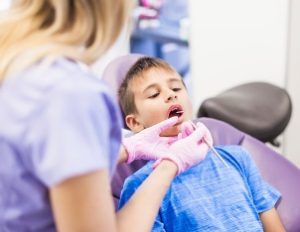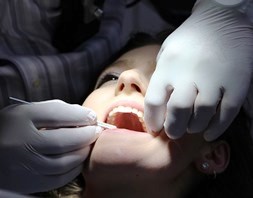Dental Hygiene Training Programs
How to Select the Right One Near Minneapolis Minnesota
 A critical first step to begin your new profession in preventive dentistry is to enroll in the right dental hygienist college near Minneapolis MN. But before you can make your selection, you need to analyze and compare your school options. There is far more to performing your due diligence than selecting the training with the most affordable tuition or enrolling in the college that is nearest to your home. There are other important factors to consider also, such as the school's accreditation and reputation. Dental hygienists generally earn an Associate Degree, as compared to a certificate usually earned by assistants, and can take anywhere from two to three years to finish. And therefore there is more expense associated with the prolonged education of a hygienist as compared to an assistant. We will cover all of these concerns and additional questions that you should be asking the dental hygienist programs you are looking at later in this article. But first, let's explore the duties of dental hygienists and the training programs offered.
A critical first step to begin your new profession in preventive dentistry is to enroll in the right dental hygienist college near Minneapolis MN. But before you can make your selection, you need to analyze and compare your school options. There is far more to performing your due diligence than selecting the training with the most affordable tuition or enrolling in the college that is nearest to your home. There are other important factors to consider also, such as the school's accreditation and reputation. Dental hygienists generally earn an Associate Degree, as compared to a certificate usually earned by assistants, and can take anywhere from two to three years to finish. And therefore there is more expense associated with the prolonged education of a hygienist as compared to an assistant. We will cover all of these concerns and additional questions that you should be asking the dental hygienist programs you are looking at later in this article. But first, let's explore the duties of dental hygienists and the training programs offered.
It Takes Just a Few Minutes to Start Your Dental Hygienist Career Below
Dental Hygienist Job Description

When contrasting the job of a dental assistant to that of a hygienist, the most significant difference is undoubtedly that the hygienist works more on their own. Dental assistants work with and in support of the Minneapolis MN dentists and the practice. Hygienists, while also assisting the practice, deal with the patients more on a one-to-one basis. They are often the initial person a patient encounters when called from the waiting area. They examine each patient's gums and teeth and present their results to the dentists. They may also carry out basic procedures. Based on state law, a hygienist's duties may include:
- Removing stains, tartar and plaque
- Administering fluoride treatments
- Polishing teeth and applying sealants
- Educating patients about oral hygiene
- Taking X-rays and developing film
- Removing sutures and applying fillings
Dental Hygienist Training Options
As a result of the increased responsibility as compared to an assistant, dental hygienists employed in Minneapolis MN dental offices are often required to hold an Associate Degree in dental hygiene rather than a certificate. These programs can require anywhere from two to as long as three years to finish and must be accredited by the CDA in almost every state. They are offered in trade and technical schools as well as community colleges. And in addition to classroom studies learning the fundamentals of dental hygiene, there will be a clinical component to the training as well. Some programs also sponsor internships with local dentists or dental practices.Online Dental Hygienist Training
 Enrolling in an online dental hygienist school may be a good alternative for getting your education. Just remember that the classes will not be 100% online, since there will be a practical component to your training. But the balance of your classes will be accessible via your personal computer in the comfort of your Minneapolis MN home or elsewhere on your laptop or tablet. For those continuing to work while attending college, online dental programs make education far more accessible. Some may even offer lower tuition fees than their traditional counterparts. And additional expenses for items like commuting, books and school supplies may be reduced as well. The clinical training can typically be performed at an area dental practice or in an on-campus lab. With both the online and clinical training, everything required to obtain the proper education is provided. If you have the dedication for this style of learning, you might find that attending an dental hygienist online school is the ideal choice for you.
Enrolling in an online dental hygienist school may be a good alternative for getting your education. Just remember that the classes will not be 100% online, since there will be a practical component to your training. But the balance of your classes will be accessible via your personal computer in the comfort of your Minneapolis MN home or elsewhere on your laptop or tablet. For those continuing to work while attending college, online dental programs make education far more accessible. Some may even offer lower tuition fees than their traditional counterparts. And additional expenses for items like commuting, books and school supplies may be reduced as well. The clinical training can typically be performed at an area dental practice or in an on-campus lab. With both the online and clinical training, everything required to obtain the proper education is provided. If you have the dedication for this style of learning, you might find that attending an dental hygienist online school is the ideal choice for you.
Issues to Cover With Dental Hygienist Programs
Now that you have decided to become a dental hygienist in Minneapolis MN, you can begin the process of comparing programs and schools. As we discussed at the start of this article, many students start by looking at the cost and the location of the colleges. Perhaps they search for several online options as well. Although these are relevant initial factors to consider, there are a few additional questions that you need to ask of the colleges you are reviewing in order to reach an informed decision. Toward that end, we have provided a list of questions to help you with your due diligence and final selection of the right dental hygienist school for you.
Is the Dental Program Accredited? There are a number of valid reasons why you should only pick an accredited dental hygienist school. If you are going to become certified or licensed, then accreditation is a condition in nearly all states. To qualify to take the National Board Dental Hygiene Exam, your dental college must be accredited by the Commission on Dental Accreditation (CDA). Accreditation also helps guarantee that the instruction you get is comprehensive and of the highest quality. Minneapolis MN employers frequently prefer or require that new hires are graduates of accredited colleges. And finally, if you are applying for financial aid or a student loan, frequently they are not obtainable for non-accredited schools.
Is Sufficient Clinical Training Provided? Practical or clinical training is an essential portion of any dental training program. This applies for the online school options as well. Most dental hygienist colleges have relationships with area dental offices and clinics that furnish clinical training for their students. It's not only essential that the school you enroll in offers adequate clinical hours but also provides them in the kind of practice that you subsequently would like to work in. For example, if you are interested in a career in pediatric dentistry, check that the program you select offers clinical rotation in a local Minneapolis MN dental office that specializes in dental care for children.
Is There an Internship Program? Verify if the dental schools you are considering sponsor an internship program. Internships are undoubtedly the best method to receive hands-on, clinical experience in a professional dental practice. They make it easier for students to transition from the theoretical to the practical. They can also help students establish working relationships in the professional dental community. And they look good on resumes also.
Is Job Placement Help Furnished? Many students that have graduated from dental hygienist schools require help obtaining their first job. Check if the schools you are researching have job placement programs, and what their job placement rates are. Schools with high job placement rates are likely to have good reputations within the Minneapolis MN dental profession in addition to extensive networks of contacts where they can place their students for internships or employment.
Are Classrooms Small? Ask the programs you are interested in how large typically their classrooms are. The smaller classes generally provide a more personal environment for learning where students have greater access to the instructors. On the other hand, larger classes often are impersonal and provide little one-on-one instruction. If practical, ask if you can attend a few classes at the Minneapolis MN dental hygienist school that you are leaning toward so that you can witness first hand the degree of interaction between teachers and students before making a commitment.
What is the Entire Expense of the Program? Dental hygiene colleges can differ in cost based on the length of the program and the amount of clinical training provided. Other factors, such as the reputations of the colleges and whether they are public or private also have an impact. But besides the tuition there are other substantial expenses which can add up. They can include expenses for such things as commuting and textbooks as well as school equipment, materials and supplies. So when comparing the cost of colleges, don't forget to include all of the costs related to your education. The majority of schools have financial assistance departments, so be sure to find out what is offered as far as loans, grants and scholarships in the Minneapolis MN area.
Are the Classes Accessible? Before selecting a dental hygienist college, you must confirm that the assistant or hygienist program furnishes classes that fit your schedule. This is especially true if you will be working while getting your education and have to go to classes near Minneapolis MN in the evenings or on weekends. And even if you choose an online school, you will still have to schedule your clinical training classes. Also, while addressing your concerns, ask what the make-up practice is if you should need to miss any classes because of work, illness or family responsibilities.
Learn More About Training to Become a Dental Hygienist in Minneapolis
Pick the Best Minneapolis Dental Hygienist Program
Enrolling in the ideal dental hygienist course is crucial if you want to take the National Board Dental Hygiene examination or, if mandated in your state, become licensed. As you now know, there are many alternatives offered to receive your education and it takes a fairly short amount of time to become a dental hygienist. You can obtain your formal training through dental hygienist programs at community colleges, vocational schools, technical institutes and trade schools. Graduates of these schools generally obtain an Associate Degree. Dental Hygienists usually require about two years of studies before they enter the job market. When earning a degree you can choose to attend classes on-campus or online. Whichever mode of training you elect to pursue, by asking the questions provided in this article you will be in a better position to make the ideal selection. And by doing so, you will be ready to commence your journey toward becoming a dental hygienist in Minneapolis Minnesota.
Minneapolis Dental Hygienist Colleges | Minneapolis Dental Hygienist Schools Near Me
